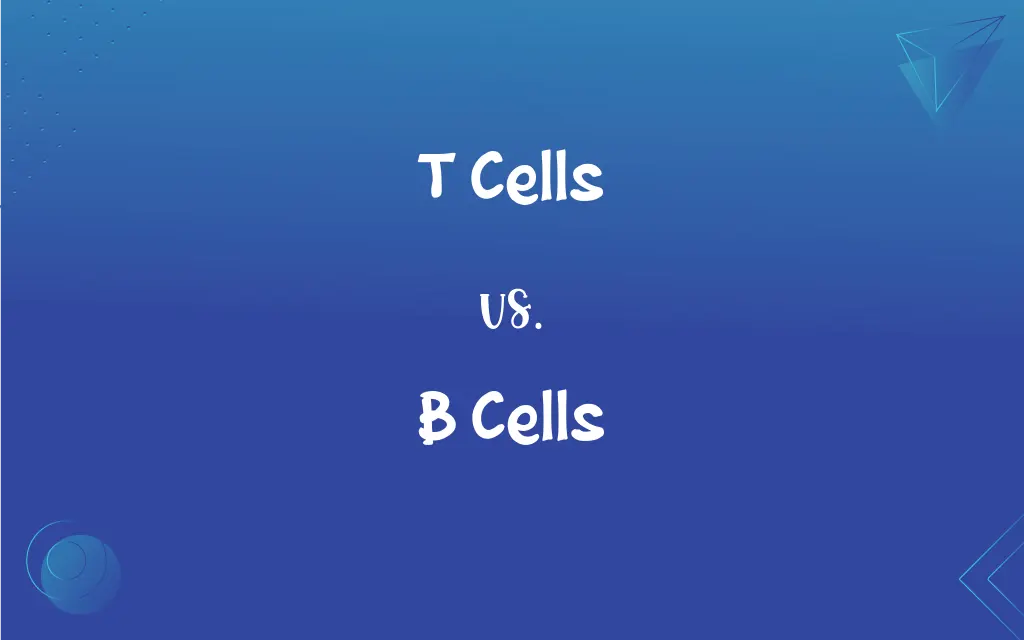T Cells vs. B Cells: What's the Difference?
Edited by Aimie Carlson || By Harlon Moss || Updated on October 13, 2023
T cells are a type of lymphocyte involved in cell-mediated immunity; B cells produce antibodies for humoral immunity.

Key Differences
T cells and B cells are both crucial components of our immune system, with each playing a unique role in defending against pathogens.
T cells, originating from the thymus, are primarily involved in cell-mediated immunity, identifying and eliminating infected cells directly. On the other hand, B cells, which mature in the bone marrow, are responsible for humoral immunity, producing and releasing antibodies that can neutralize foreign invaders.
While T cells directly attack and destroy infected cells, B cells function by releasing antibodies that tag pathogens for destruction by other immune cells. Thus, T cells and B cells collaborate closely, ensuring that both intracellular and extracellular threats are addressed.
Both T cells and B cells have the capability to remember past pathogens, which provides the basis for the adaptive immune system, ensuring a faster and stronger response to previously encountered threats.
Comparison Chart
Origin
Develops and matures in the thymus.
Develops and matures in the bone marrow.
ADVERTISEMENT
Main Function
Cell-mediated immunity; attacks infected cells directly.
Humoral immunity; produces antibodies to tag pathogens.
Immunity Type
Deals with intracellular threats.
Deals with extracellular threats.
Memory
Has memory T cells that remember specific antigens.
Has memory B cells that can quickly produce specific antibodies for known pathogens.
Activation
Activated by antigen-presenting cells.
Activated by the binding of an antigen to the B cell receptor or by helper T cells.
T Cells and B Cells Definitions
T Cells
T cells originate and mature in the thymus.
A deficiency in the thymus can lead to a decreased number of T cells.
ADVERTISEMENT
B Cells
B cells are lymphocytes responsible for producing antibodies.
When the body is exposed to bacteria, B cells generate antibodies to neutralize them.
T Cells
T cells directly attack and destroy infected cells in the body.
When the flu virus infects lung cells, T cells will target and eliminate these compromised cells.
B Cells
B cells play a pivotal role in humoral immunity.
In response to a vaccine, B cells produce antibodies that can recognize the vaccine's target pathogen.
T Cells
T cells require activation by antigen-presenting cells to function.
Dendritic cells present antigens to T cells, prompting them to initiate an immune response.
B Cells
B cells can be activated by antigens or helper T cells.
After a vaccination, certain B cells are activated and start producing specific antibodies.
T Cells
T cells are lymphocytes that aid in cell-mediated immunity.
After a virus invasion, T cells help in destroying the infected cells directly.
B Cells
B cells mature in the bone marrow.
A defect in the bone marrow can lead to a deficiency in B cells.
T Cells
T cells can recognize and remember specific pathogens.
Once T cells have encountered a specific virus, they can respond more efficiently upon re-exposure.
B Cells
B cells can differentiate into memory cells or plasma cells.
Memory B cells ensure a rapid response upon subsequent exposure to a known pathogen.
FAQs
What is the primary function of B cells?
B cells produce and release antibodies to tag and neutralize pathogens.
Can both T cells and B cells remember past pathogens?
Yes, both have memory cells that ensure a quicker response to previously encountered threats.
How do B cells contribute to vaccines' effectiveness?
B cells produce antibodies in response to vaccines, providing immunity against specific pathogens.
Where do T cells originate?
T cells originate and mature in the thymus.
How do T cells recognize pathogens?
T cells recognize pathogens through antigen-presenting cells.
What is the difference in immunity between T cells and B cells?
T cells deal with intracellular threats, while B cells handle extracellular threats.
How do B cells recognize pathogens?
B cells recognize pathogens through specific receptors on their surfaces.
Can T cells and B cells work together?
Yes, they often collaborate in immune responses, with T cells aiding in the activation of B cells.
What happens when there's a deficiency in T cells?
A deficiency in T cells compromises cell-mediated immunity, making one susceptible to certain infections.
How are B cells involved in allergic reactions?
B cells produce IgE antibodies in allergies, which trigger histamine release, leading to allergic symptoms.
What's the lifespan of T cells and B cells?
Their lifespan varies, with some living only days, while memory cells can persist for years.
Can we measure the number of T cells and B cells in the blood?
Yes, specific tests, like flow cytometry, can determine the count and types of T and B cells.
Are T cells and B cells affected by HIV/AIDS?
Yes, especially T cells. HIV primarily targets and reduces the number of helper T cells, compromising the immune system.
What are T cells and B cells?
T cells aid in cell-mediated immunity, while B cells produce antibodies for humoral immunity.
Do T cells produce antibodies?
No, T cells do not produce antibodies; that's the function of B cells.
What role do T cells play in autoimmune diseases?
In autoimmune diseases, T cells may mistakenly target and attack the body's own cells.
Are there different types of T cells?
Yes, there are several types, including helper T cells, cytotoxic T cells, and regulatory T cells.
How can the number of B cells in the body be increased?
Vaccinations and certain infections can stimulate an increase in specific B cells.
Why is the balance between T cells and B cells important?
An imbalance can lead to immune system disorders, either overactivity or underactivity.
What triggers the activation of B cells?
B cells are activated by binding to antigens or interaction with helper T cells.
About Author
Written by
Harlon MossHarlon is a seasoned quality moderator and accomplished content writer for Difference Wiki. An alumnus of the prestigious University of California, he earned his degree in Computer Science. Leveraging his academic background, Harlon brings a meticulous and informed perspective to his work, ensuring content accuracy and excellence.
Edited by
Aimie CarlsonAimie Carlson, holding a master's degree in English literature, is a fervent English language enthusiast. She lends her writing talents to Difference Wiki, a prominent website that specializes in comparisons, offering readers insightful analyses that both captivate and inform.































































